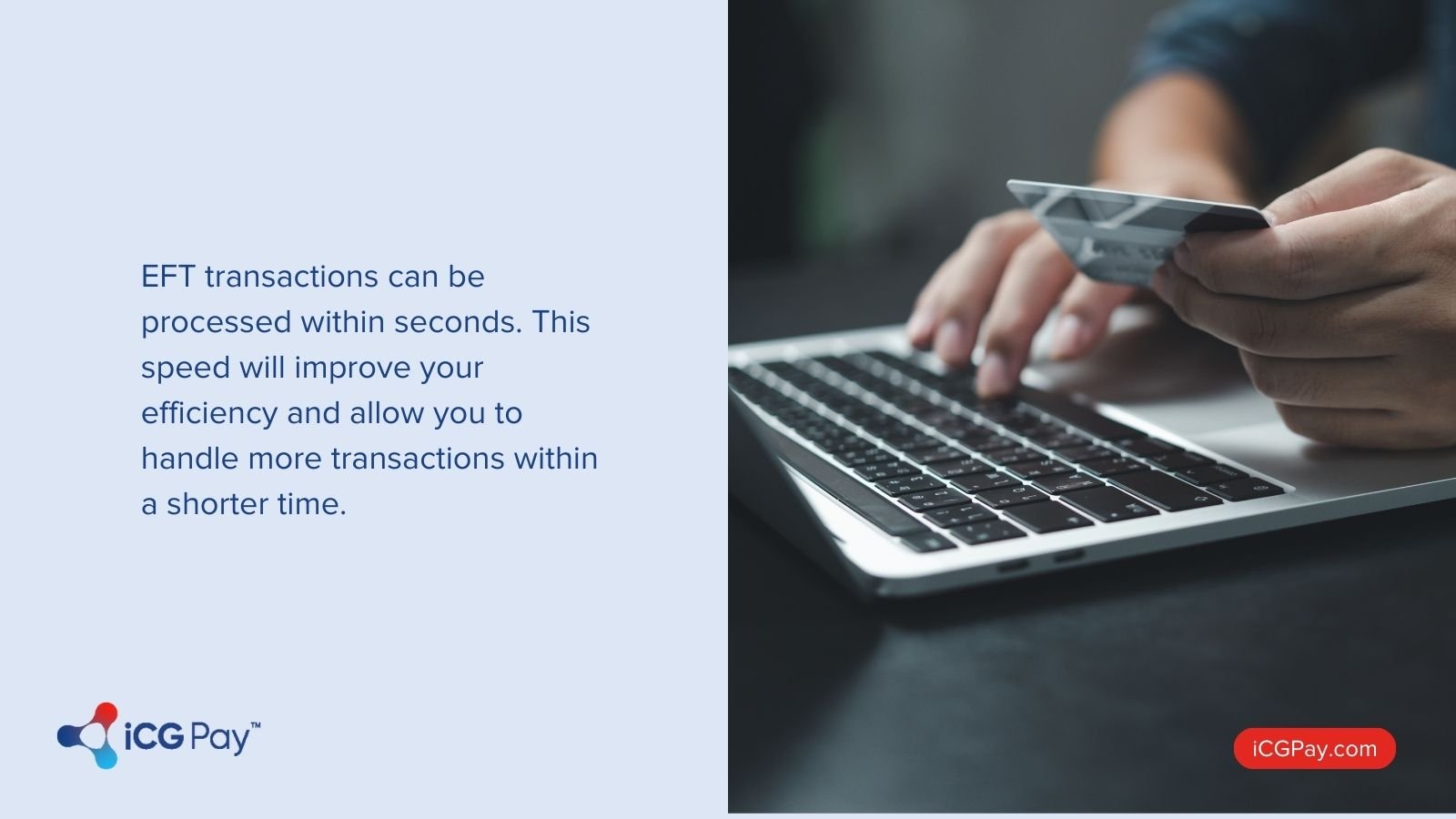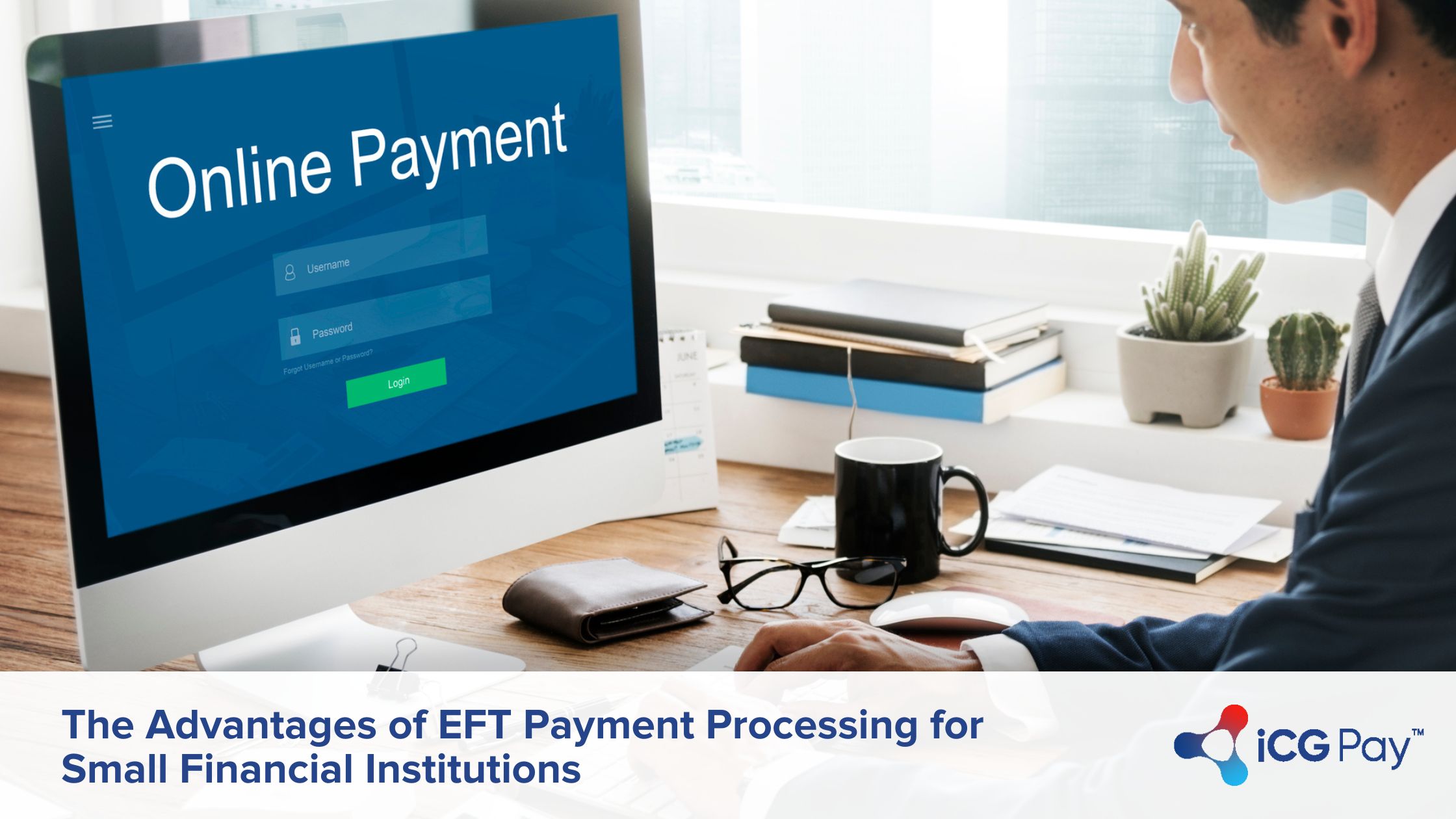You’ve probably used Electronic Funds Transfer (EFT) payments without realizing it. EFT has become a standard payment method whether you need to set up automatic bill payments, pay for online purchases, or receive your salary directly into your bank account. According to Wise, 96% of Americans receive their salary via direct deposit.
This payment service is not only used by large organizations. With the rapid advancement in digital payments, it’s becoming essential for small financial institutions to embrace EFT to streamline their payment operations, improve efficiency, and meet customer expectations in the digital age. By embracing EFT, these institutions can provide customers with more convenience and accelerate their payment processing times.
This blog post will examine how small financial institutions such as community banks and credit unions benefit from EFT payment processing and how it can enhance their operations and customer experience.
Understanding EFT Payment Processing
EFT payment processing refers to the electronic movement of money without needing physical checks and cash. These transactions are essential for facilitating electronic money transfers between bank accounts because they are faster, more affordable, and offer improved accuracy and increased security. This is a more reliable and convenient way to transfer funds than traditional payment methods.
Here are the different types of EFT payments:
- ACH Transfers: As one of the most common types of electronic fund transfers, ACH technology is growing rapidly. In 2023, the ACH Network managed an impressive 31.5 billion payments, valued at $80.1 trillion. This marked a 4.8% increase in payment volume and a 4.4% rise in payment value compared to 2022. ACH is commonly used for bill payments, direct deposits, person-person (P2P), and business transactions.
- Wire Transfers: These transfers involve moving money from one bank account to another, either locally or internationally. They are used to transfer large sums of cash when you have time-sensitive transactions.
- Direct Deposits: These EFT payments are used when depositing funds directly into the recipient’s bank account. This method is commonly used for recurring payments like pensions, employee salaries, and tax refunds.
Benefits for Small Financial Institutions
As a small financial institution, you must use EFT payment processing in your day-to-day operations. Why is that? Here are some benefits you get from these electronic transfers:
Streamlined Payment Operations
EFT benefits your institution by enabling efficient and fast transfer of funds between accounts. Unlike traditional paper-based methods like checks, which need manual transportation, EFT transactions can be processed within seconds. This speed will improve your efficiency and allow you to handle more transactions within a shorter time.

Reduced Manual Processes
EFT eliminates the need for manual processing, physical checks, and postage. In addition, your financial institution doesn’t have to handle check printing, storage, or transportation. You don’t have to invest in manual processes when everything gets handled electronically.
Minimized Risk of Errors and Fraud
As a financial institution, you need to have measures to help you detect and prevent fraud. By adopting EFT payments, you can implement robust encryption and tokenization protocols to protect sensitive customer information during electronic transactions. These security measures minimize the risk of identity theft and data breaches.
Improved Cash Flow Management
With EFT, faster processing times make funds available much quicker. This accelerated cash flow improves liquidity and the institution’s ability to meet its financial obligations. In addition, it’s also easier to access real-time transaction data to monitor and manage cash flow.
Benefits for Customers
Adopting EFT payment processing is also beneficial to your customers. Here are some benefits:
- Faster Transactions: EFT payments are fast and efficient; therefore, customers don’t have to wait for traditional paper-based processes like mailing checks or visiting a branch to deposit cash. EFT transactions can be completed electronically in minutes.
- Reduced Reliance on Paper Checks: Writing, mailing, and processing physical checks can be time-consuming and lead to errors. With EFT, the possibility of misplaced or lost checks is reduced.
- 24/7 Availability: Electronic payments are convenient to customers because they can initiate transactions anytime. Customers can transfer cash, schedule payments like recurring bills, and purchase online, even during weekends and holidays.
- Enhanced Security: EFT payment systems are highly secure. They have encryption and authentication protocols to help protect sensitive financial information. Data remains confidential, and unauthorized individuals can’t access it.
Security and Risk Mitigation
According to the Federal Trade Commission, consumers reported losing over $10 billion to fraud in 2023, an all-time high and a 14% increase compared to the previous year's losses. As fraud cases continue to increase, financial institutions must implement security measures to protect EFT payments. Here are the security aspects of EFT payment processing for small financial institutions:

Industry Standards
Small financial institutions must adhere to industry standards like the Payment Card Industry Data Security Standard (PCI DSS). These security measures provide guidelines to secure payment data and prevent fraud.
Encryption Methods
Small financial institutions need robust encryption methods like SSL and TLS to protect sensitive financial data. This ensures that data transmitted between systems is protected from possible security breaches.
Authentication Protocols
You need robust authentication protocols to prevent identity fraud during EFT payment processing. This could be multi-factor authentication (MFA) or two-factor authentication (2FA), which verifies the user’s identity accessing the payment system.
Risk Mitigation Measures
Small financial institutions must implement regular security audits to identify vulnerabilities. In addition, you need to provide comprehensive employee training and enforce access controls to prevent unauthorized access.
Compliance with Regulatory Requirements
Banking organizations should comply with regulatory requirements such as the Gramm-Leach Bliley Act (GLBA), which dictates the protection of customer financial information. This includes compliance with data privacy laws, breach notifications, and proper vendor management.
Integration and Implementation Considerations
Choosing a reliable payment processor for your small financial institution is essential. Here are the factors to consider before implementing EFT payment processing systems:
- System Compatibility: Before choosing an EFT payment processing partner, examine its compatibility with your existing structure. It should seamlessly integrate with your core banking software to ensure smooth data flow.
- Scalability: You need a solution to accommodate the current transaction volumes and scale up as the business grows.
- Ease of Integration With Existing Infrastructure: A smooth integration minimizes disruption to your operations. Choose a processing system with APIs that seamlessly connect with your current infrastructure.
Real-World Successful Implementation of EFT Payment Processing
Community Credit Union previously allowed members to collect a loan or withdraw money from their savings via a check or cash. However, they introduced EFT payment processing, allowing members to transfer money to a bank account or pay a bill.
Customers can receive the funds within two business days after the transaction. This payment processing makes cash available much faster and safer because customers don’t need to handle cash. Because of this, customers are more satisfied, and the credit union is more efficient in its operations.
Boost Your EFT Game Today!
EFT payment processing streamlines operations, improves customer satisfaction, enhances security, and saves costs. In this digital age, your financial institution must provide diverse payment options to meet customer expectations. Therefore, you must evaluate your needs and consider the benefits of EFT payment processing before choosing a technology partner.
Partnering with a reliable company like iCG Pay, formerly known as iCheckGateway.com, will help you secure your banking systems and ensure that you meet industry standards. To get started, contact our experts today.





